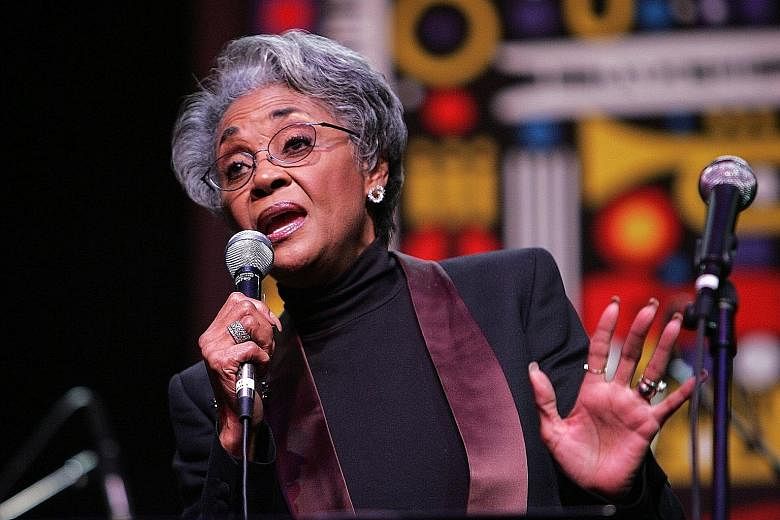NEW YORK • Nancy Wilson, whose skilled and flexible approach to singing provided a key bridge between the sophisticated jazz-pop vocalists of the 1950s and the powerhouse pop-soul singers of the 1960s and 1970s, died last Thursday at her home in Pioneertown, California. She was 81.
Her death was confirmed by her manager Devra Hall Levy, who said Wilson had been ill for some time; she gave no other details.
In a long and celebrated career, Wilson performed American standards, jazz ballads, Broadway show tunes, R&B torch songs and middle-of-the-road pop pieces, all delivered with a heightened sense of a song's narrative.
"I have a gift for telling stories, making them seem larger than life," she told the Los Angeles Times in 1993. "I love the vignette, the plays within the song."
Some of Wilson's best-known recordings told tales of heartbreak, with attitude. A forerunner of the modern female empowerment singer, with the brassy inflections and biting inflections to fuel it, Wilson could infuse even the saddest song with a sense of strength.
In her canny signature piece from 1960, Guess Who I Saw Today (written by Murray Grand and Elisse Boyd), a woman baits her husband by dryly telling him a story in which he turns out to be the central villain.
In her 1968 hit, Face It Girl, It's Over (by Francis Stanton and Angelo Badale), Wilson first seems to throw cold water in the face of a woman who fails to notice that her lover has lost interest in her. Only later does she reveal that she is the benighted woman scorned.
Face It Girl, an epic soul blowout, became one of Wilson's biggest chart scores, making the Top 30 of Billboard's pop chart and Top 15 on its R&B list.
Her biggest hit came in 1964, when (You Don't Know) How Glad I Am (Jimmy Williams and Larry Harrison), a rapturous R&B ballad delivered with panache, reached No. 11 on Billboard's pop chart.
Three years later, she became one of the few African-Americans of her day to host a TV programme, the Emmy-winning Nancy Wilson Show on NBC.
A hardworking and highly efficient singer, Wilson released more than 70 albums in a five-decade recording career.
She won three Grammy Awards, one for best rhythm and blues recording for the 1964 album How Glad I Am, and two for best jazz vocal album, in 2005 and 2007. In 2004, she was honoured as a Jazz Master by the National Endowment for the Arts.
Nancy Sue Wilson was born Feb 20, 1937, in Chillicothe, Ohio, the first of six children of Olden Wilson, a supervisor at an iron foundry, and Lillian (Ryan) Wilson, a maid.
Her father introduced her to records by mainly male artists, like Nat King Cole, Billy Eckstine and Jimmy Scott, when he sang with Lionel Hampton's Big Band.
"Much of my phrasing is so similar to Jimmy Scott's," Wilson told The Los Angeles Times.
Her music moved with the times. She cut songs written by the Beatles and Stevie Wonder on her 1966 album A Touch Of Today and later incorporated disco and R&B styles before moving back to jazz on her later albums, culminating in Turned To Blue in 2006.
Wilson's marriage in 1960 to drummer Kenny Dennis ended in divorce a decade later. In 1973, she married Wiley Burton, a Presbyterian minister, and remained with him until his death in 2008.
She is survived by her three children, Kacy Dennis, Sheryl Burton and Samantha Burton; two sisters, Karen Davis and Brenda Vann; and five grandchildren.
NYTIMES

